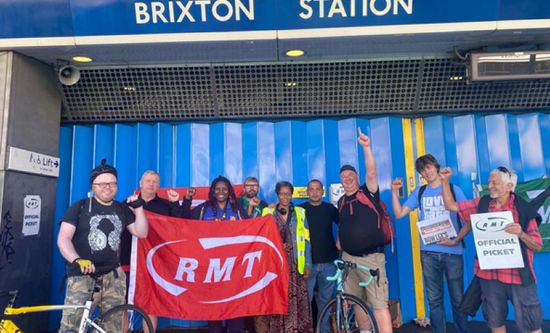
Rampant inflation and rising energy prices, combined with stagnant wages, are fuelling anger and desperation among increasing sections of the organised working class. This simmering resentment and willingness to act against worsening conditions drove a surge in strike action by unions in Britain over the summer. The first strikes announced in June by the Rail, Maritime and Transport Workers (RMT), were followed by action from dockers in Felixstowe and Liverpool, and postal workers from the Communication Workers Union (CWU), challenging Royal Mail in a dispute over pay and working practices. But this rise in organised working class resistance was brought to a grinding halt on 8 September, when the main unions announced they were postponing strike action as ‘a mark of respect’ following the death of Queen Elizabeth.
Up and down the country tens of thousands of RMT had sparked the largest wave of industrial action in Britain since 1989. On 21 June 40,000 rail workers from Network Rail walked out over pay and changes to working practices that would require redundancies. They were accompanied by workers from London Underground who directed a 24-hour strike on the same date; the strikes were called after their demands for a 7% pay increase were rejected in favour of a management proposal of 3%. Further planned strikes were organised throughout July and August, alongside members of other rail unions such as the Associated Society of Locomotive Engineers and Firemen (ASLEF) and Transport Salaried Staffs’ Association (TSSA). 80% of rail services across England, Scotland and Wales were affected.
On 28 August, at Britain’s busiest container port in Felixstowe, 1,900 workers ended an eight-day walk-out over a proposal of a 7% pay increase with no formal agreement. The below-inflation pay offer would amount to a pay cut in real terms.
August saw Royal Mail forced to rely on around 6,000 temporary staff as 115,000 postal workers went on strike. Workers from around Britain held picket lines in Hull, Preston and other locations, in a dispute over wage increases. The squeeze on Royal Mail workers reflects a system in crisis, as fierce competition from Amazon and DPD has played a key role in causing Royal Mail’s stock to drop by 50% in the last year; the company will not — and says it cannot — afford to pay its workers more than the 3% it has offered, as paying in line with the rise of inflation would cost it £230m.
Also in August, staff at an Amazon warehouse in Tilbury staged a walkout over what the GMB union said amounted to a 35p an hour pay increase. Industrial action spread to depots including Dartford and five other sites where the union said some members were on a go-slow, limiting work to one package an hour. Even criminal barristers are staging an indefinite strike over cuts to legal aid.
While the strikes reflect very real pressure on workers as they see their pay worth ever less in the face of rising inflation, they have also reflected limitations in the ability of the unions to lead a consistent struggle in defence of the working class against the cost-of-living crisis. The most blatant example of this was the immediate capitulation of the RMT, CWU, UNITE and ASLEF in the face of the death of the queen, the epitome of ruling class power. In contrast to months of balloting and support of thousands of trade union members for action, it took the NECs of the RMT, ASLEF and the CWU just 50 minutes after the announcement of the death to call off all planned action during the period of mourning. ‘RIP Queen Elizabeth II’, the RMT posted on its website announcing the suspension of strike action in September, ‘the RMT joins the whole nation in paying its respects to Queen Elizabeth…We express our deepest condolences to her family, friends and the country.’ Its sentiments were echoed by ASLEF and the CWU. Unite also called off proposed action, including a bus strike in London ‘out of respect for the period of National Mourning’. The Royal College of Nursing instructed its members to cease campaigning and postponed a planned ballot for strike action, which will now take place in October.
Strikes and industrial action are resuming. 560 Liverpool dockers have walked out over a de facto pay cut and at the end of September, nearly 2,000 workers at the Felixstowe docks will resume their action. The RMT has announced three new strike dates and more are sure to follow. But their abject subservience to ‘the national interest’ is a further sign of the limitations of the unions in defending the rights of workers. Even before the death of the queen, it was clear that sections of the trade union movement were more interested in harnessing workers’ frustrations to the Labour electoral bandwagon than actually representing their members’ interests. Even UNITE leader Sharon Graham’s modest demand that Labour leader Keir Starmer should ‘grow a spine’ over support for picket lines proved too much for the traditionally right-wing union USDAW, whose leader Paddy Lillis described her comments as ‘unfair’ and warned union leaders that their main role was to support a Labour election victory and focus on ‘getting rid of the Tories’. Such comments deliberately mask the fact that the Labour Party will not fight for the working class – as should be obvious from Starmer’s instruction to shadow cabinet members not to attend RMT picket lines. To focus exclusively on the Conservative government is to deny the reality of a crisis created by the capitalist system. But low wages, under-employment, inflation and all the elements of the current cost of living crisis are here to stay, unless the working class maintains a consistent and organised resistance. The question is – who is going to lead that resistance, as the struggle of working people intensifies over the coming winter?
Alex Scurr




